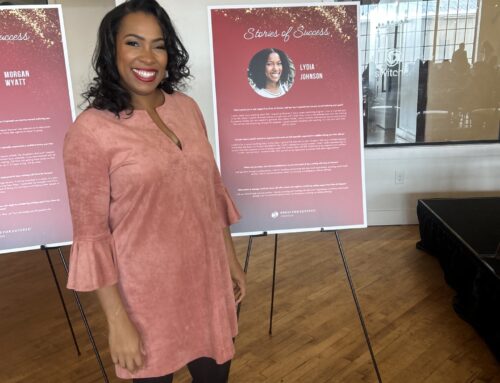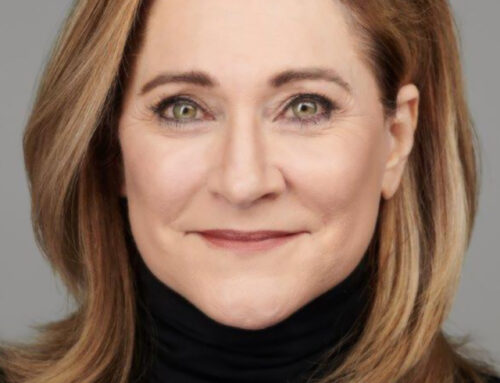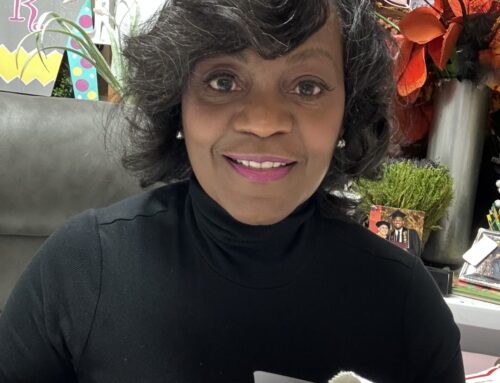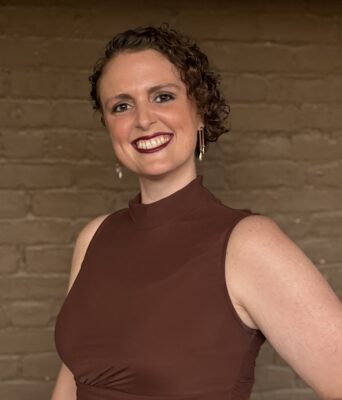
By Chris James
At Fern Creek High School, the sound of voices lifting in unison is more than music—it’s healing. It’s hope. At the center of it all stands Talor Byrd, Director of Choral Activities, whose purpose is as clear as the notes her students sing.
“The music’s great, but the kids are the priority. I just want them to have as many high-quality experiences as possible,” she said.
The Starting Point
Byrd’s journey into education began not with a single moment, but with a series of transformative ones. Growing up in Louisville, she attended Kammerer Middle and Ballard High School—both part of Jefferson County Public Schools. Those choir rooms shaped her love for music and teaching.
“I had really excellent teachers,” she recalls. “I always knew I wanted to come back to JCPS. Even as a student, I saw the inequities. Some schools had amazing programs, while others didn’t. For me, it was important to come home and offer opportunities to kids who might not otherwise have them.”
That sense of purpose has defined Byrd’s career. She spent nine years teaching middle school before moving to Fern Creek, where she’s now in her fifth year leading the choral program.
Her classroom is a refuge—a space where students can be themselves and feel seen.
“I have kids that tell me they come to school because of choir,” she says. “It’s where they can feel connected, make friends, and be part of something bigger. I’ve got kids who struggle in other classes, but when they walk into my room, they shine.”
Byrd’s belief that every student deserves a safe, affirming space drives her approach. Her classroom is not just about technique and performance; it’s about belonging and transformation. “Some of these kids are dealing with things no teenager should have to,” she explains. “If I can give them something positive—a safe place—that’s why I do what I do.”
When House Bill 208 banned cell phones during JCPS class time, many educators worried about how students would adjust. Byrd wasn’t one of them—Fern Creek had already been leading the way.
“We piloted the phone-free policy last year using Yondr pouches,” she explains. “The first 8 to 12 weeks, it was a battle. Now, we’re at a point where we still use the pouches as a tool, but honestly, we don’t need them as much because students are used to it.”
Byrd says the impact has been nothing short of transformational. She says the cell phone free classrooms have made her a better teacher. “[My students] are much more connected, they talk more and interact more, it’s a really night and day difference that I didn’t realize how bad it was until the phones were gone.”
Byrd doesn’t shy away from discussing the challenges her students face outside the classroom.
“Our kids are dealing with things that even our generation never dreamed of,” she says.
Between what they see on the internet, the violence, the drugs, the pressure—it’s can be a lot for students she teaches.
“Some of my students work to help their families or watch their siblings at night, so I try to provide as many opportunities as possible during the school day,” she says. “The school has an impact and the school has a responsibility, but these kids are bringing things to school with them, emotionally, socially, that they just shouldn’t know—they shouldn’t be exposed to and that’s what’s hard, is seeing kids that have had to grow up super-fast because of the technology, because of their home life, because of the community environment.”
She’s candid about the emotional toll that comes with loving her students deeply. “I tell them I love them every day,” Byrd says. “And they say, ‘Love you, mean it, Mrs. Byrd.’ They really are my kids.”
Still, she emphasizes that Fern Creek’s community—both inside and outside the school—is extraordinary. “It’s like a family. My wife works here too, as a special education teacher. We have so many teachers who went to Fern Creek and came back to teach here. Everyone pours into these kids.”
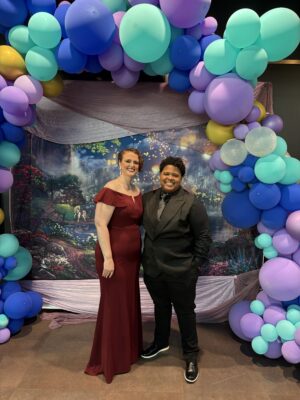
Talor and her wife Faith chaperoning Senior Prom in May 2025
Balancing Work, Wellness, and Womanhood
As an educator, wife, and mother, Byrd’s advice to other women in education is simple yet profound: find balance early.
“When you first start teaching, it’s easy to pour your whole self into it,” she reflects. “But eventually you realize—you can be replaced at work. You can’t be replaced in your family.”
Byrd has learned to set boundaries that protect her mental health. “I don’t attach my work email to my phone. I take breaks. You have to take care of yourself and you have to take care of your family.”
She feels prioritizing a work-life balance was a big learning curve she struggled with for a while but now says she uses her time more efficiently.
“I’m much better at balancing what I do and being able to come home and leave work at work,” she says.
Outside of teaching, Byrd is a devoted wife to Faith and mom to their almost-two-year-old daughter, Imani. Family life, she says with a laugh, leaves little room for quiet. “There’s quiet right now because she’s asleep,” she jokes during our interview.
But when she does have time, Byrd nurtures another passion—textured hair care. Her side business, Talor’s Twists, Braids and Curly Days, focuses on helping interracial families and foster parents learn how to care for curly and textured hair.
Byrd journey began by wanting to understand her wife’s hair and eventually her daughter’s. She says there was a need for interracial and foster parents to learn how to care for textured hair.
“As a white Mom, I wanted to know how to do my daughter’s hair, and there’s no worse feeling than feeling like I don’t know what I’m doing,” she says.
The need for learning was there, and Byrd felt like she could take the acquired knowledge and share it with others. You can support her business by following her Instagram and YouTube pages.
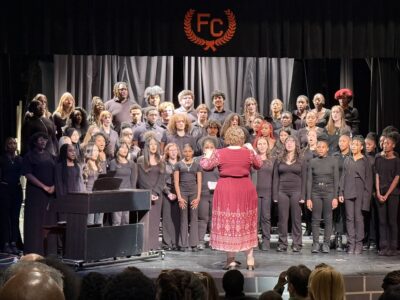
Talor, pictured in the red dress, directing choir at Fern Creek High School
Home Is Where The Heart Sings
For Byrd, Louisville will always be home.
“Growing up here, I was always like ‘I got to get out of here’,” she admits. Since she’s gotten older and wiser, Byrd says she loves it here.
Citing the diversity along with the welcoming and affirming community, Byrd feels as a interracial, queer family they have the support compared to previous cities where she taught.
“I just love Louisville now. I hated it growing up, but I love it now and would not live anywhere else,” she says.
Despite funding challenges and inequities, Byrd remains fiercely loyal to JCPS and her students. “Kids are kids,” she says. “They just need love, consistency, and people who care about them. I honestly hope I retire at Fern Creek—I wouldn’t teach anywhere else. I’m more supported as a teacher in JCPS than I have ever been in any place I’ve worked and that’s due to my building administration.”
As her beloved students’ voices rise every day in harmony, they carry much more than the melodies—they carry the legacy of a teacher who believes in them, advocates for them and teaches them their voices matter.
That is the most beautiful song of all.

